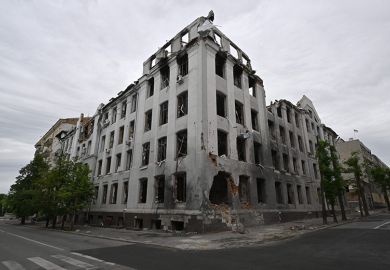Recent reports that Russia’s war in Ukraine has “triggered a collapse in its international research collaborations” suggest that Russia’s scientific community is increasingly isolated in the global space.
As a team of scientists who have studied research collaboration between Russia, Asia and Europe – regions from which we come – we suggest the statistics produced by Clarivate and reported by Times Higher Education tell a slightly different story.
While it is true that the number of internationally authored papers featuring a Russia-based researcher published in the first half of 2024 was roughly half of what it was two years earlier – 791 in April 2022 compared with 1,451 in April 2024 – it is worth noting this likely relates to a massive drop in research outputs from Russia over the past two years.
For instance, while Russian researchers published 6,265 papers in Web of Science-indexed journals in January 2022, that number fell to 3,282 papers two years on.
As we reported in a Scientometrics paper published in April, the share of Russian-authored papers with an international author – which varied between 37 per cent and 47 per cent in 2022 – has dipped only slightly since the war began, remaining around 40 per cent.
Instead, the dramatic decline actually concerns Russia’s own scientific production. And this decline of Russia’s science is mainly explained by domestic policy decisions such as departmental cutbacks, the repression of academic freedom and brain drain of leading researchers.
The reasons for the still stable degree of international collaboration can be traced back to the early reactions to the war in Western academia. At a time when Russia quickly became the most sanctioned country in the world, there was a plea by the InterAcademy Partnership (IAP), the main alliance of the world’s academies of science, to “leave no one behind” in global science collaboration. Nature would “continue to consider manuscripts from researchers anywhere in the world”, while Science found that editors and publishers of scientific journals had largely refused the call of Ukrainian scientists to decline publishing manuscripts from Russian scientists.
Despite calls for the boycott of Russian universities, global scientific communities have resisted being steered by geopolitical conflicts in this direction. Even Cern, with its important international infrastructure for nuclear science, hesitated to close the door on Russia, only choosing to sever its links in December 2023. However, our study shows that Russian participation in publications from Cern has already dropped dramatically.
Russia has indeed become isolated in fields of research that are closely related to security policy, but this is untrue for Russian science in general.
THE’s report also noted how China has replaced the US and Germany as Russia’s most frequent collaboration partner in science. Again, interpretations that are coloured by the present geopolitical situation need to be confronted with the facts and their interesting paradoxes. Collaboration with China is increasing all over the world because of the country’s increasing size and importance in science. So while Clarivate found that the proportion of Russian research with the US has fallen from 10.1 per cent to 6.7 per cent (and with Germany from 10 per cent to 5.4 per cent), we find that the relative intensity of Russian collaboration – taking into account what is going on in all other relationships in the global network of collaborating countries – is only slightly reduced with Germany and remains stable with the US.
Indeed, despite the recent deterioration of links between the White House and Beijing, the US still collaborates with a higher intensity with China than with most NATO member countries.
Fifty years ago, international scientific collaboration was mainly between member nations of NATO, but scientists nonetheless collaborated with colleagues in the Soviet Union despite the Cold War. Since then, science has grown and globalised tremendously. To expect science to realign current relationships with defence alliances would require a similarly enormous reset.
Many scientists will continue to resist such demands given their commitments to academic values of openness and co-creation of knowledge. However, a new generation of scientists growing up in a climate of confrontation may be less able to ignore political pressure to turn their back on potentially fruitful research partnerships that ultimately may benefit global science.
Lin Zhang is a full professor in the School of Information Management at Wuhan University, where Zhe Cao is a graduate student. Gunnar Sivertsen is a research professor at the Nordic Institute for Studies in Innovation, Research and Education in Oslo. Dmitry Kochetkov works at the Russian Academy of Sciences and RUDN University in Moscow while also being affiliated with Leiden University.
Register to continue
Why register?
- Registration is free and only takes a moment
- Once registered, you can read 3 articles a month
- Sign up for our newsletter
Subscribe
Or subscribe for unlimited access to:
- Unlimited access to news, views, insights & reviews
- Digital editions
- Digital access to THE’s university and college rankings analysis
Already registered or a current subscriber? Login








